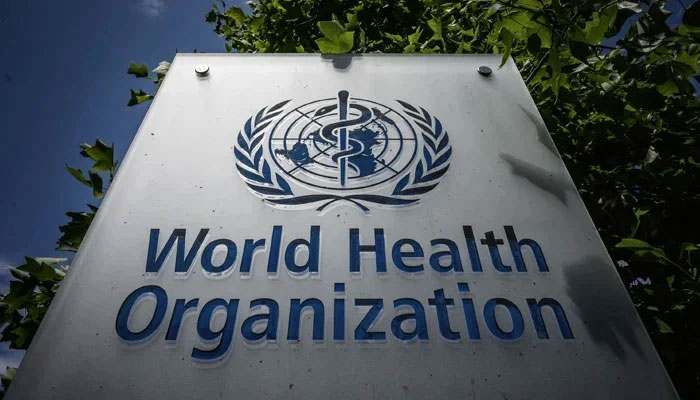Ensure all children immunised against polio, advises WHO official
“This strategy aims to strengthen overall public health capacity while achieving polio eradication”, said WHO Eastern Mediterranean Regional Director Dr Hanan Balkhy
ISLAMABAD: The World Health Organisation (WHO) has asked Pakistan to further integrate polio eradication efforts with essential immunisation programmes.
“This strategy aims to strengthen overall public health capacity while achieving polio eradication”, said WHO Eastern Mediterranean Regional Director Dr Hanan Balkhy.
A delegation lead by Dr Balkhy is in Pakistan visiting Islamabad, Peshawar and Lahore. They held meetings with Prime Minister Shehbaz Sharif, Coordinator to PM on National Health Services Dr Malik Mukhtar Ahmad, chief ministers, chief secretaries and health ministers of Khyber Pakhtunkhwa and Punjab.
The polio delegation assessed the progress, challenges and strategies employed by Pakistan’s polio eradication programme. Pakistan is one of the last two countries globally with endemic transmission of wild poliovirus.
They stressed the need to ensure all children are reached during vaccination campaigns, strengthen coordination with Afghanistan’s polio programme and intensify efforts to improve routine immunisation coverage. “While Pakistan has achieved significant epidemiological progress supported by a robust disease surveillance system, it is imperative to integrate polio eradication with essential immunisation programmes”, stated Dr Balkhy.
During her meeting with Dr Malik Mukhtar, Dr Balkhy highlighted Pakistan’s complex health landscape, noting recurrent disease outbreaks exacerbated by floods in Sindh and Balochistan. She also presented her new flagship initiatives aimed at ensuring equitable access to medicines, effective supply chain management, investment in the health workforce and tackling substance use.
In Khyber Pakhtunkhwa, Dr Balkhy learned about WHO’s initiatives to strengthen primary health care systems and advance universal health coverage. She addressed a training session on Integrated Disease Surveillance and Response systems in Peshawar and inaugurated Neonatal Intensive Care Centre, Nutrition Centre at District Headquarter Hospital in Haripur.
“More than 50pc of neonatal deaths in the Eastern Mediterranean Region are reported from Pakistan,” Dr Balkhy explained. The facilities in this centre will play important role in addressing gaps in neonatal care accessibility for children in the catchment community, she noted.
In Lahore, Dr Balkhy learned about health initiatives to boost immunisation rates in Punjab through mobile health clinics and digitised data management systems for microplanning and birth registrations.
Dr Balkhy also engaged with female vaccinators at the Civil Dispensary in Peshawar, acknowledging their crucial role in routine immunisation efforts. “Their motivation in the face of challenges was inspiring. Their role is more than just administering vaccines; they are educating mothers and caregivers, empowering them with critical health information”, Dr Balkhy remarked.
During discussions with UN Resident Coordinator in Islamabad, Dr Balkhy highlighted the challenging economic and fiscal situation in Pakistan, focusing on mutual areas of support to improve accessible health care and eradicate polio in Afghanistan and Pakistan.
Dr Balkhy’s visit included a tour of Regional Reference Laboratory for Polio at National Institutes of Health (NIH) in Islamabad. At NIH, she learned about the critical disease surveillance support provided by WHO-accredited labs for poliovirus, rotavirus, measles, and rubella in Pakistan and Afghanistan. Discussions with Dr Muhammad Salman, CEO of NIH, underscored the importance of combating antimicrobial resistance.
In a meeting at WHO’s Country Office, Dr Balkhy donated health supplies to advance universal health coverage, expressing gratitude for WHO’s efforts in responding to emergencies, strengthening health infrastructure and providing crucial capacity-building support to Pakistan’s health workforce.
“WHO remains committed to supporting Pakistan’s national health vision, aiming for universal health coverage through equitable and sustainable services”, Dr Balkhy affirmed.
-
 AI Copyright Battle: ByteDance To Curb Seedance 2.0 Amid Disney Lawsuit Warning
AI Copyright Battle: ByteDance To Curb Seedance 2.0 Amid Disney Lawsuit Warning -
 Savannah Guthrie In Tears As She Makes Desperate Plea To Mom's Kidnappers
Savannah Guthrie In Tears As She Makes Desperate Plea To Mom's Kidnappers -
 Canada’s Defence Industrial Strategy Targets 125,000 Jobs And Export Growth
Canada’s Defence Industrial Strategy Targets 125,000 Jobs And Export Growth -
 Tre Johnson, Former NFL Guard And Teacher, Passes Away At 54
Tre Johnson, Former NFL Guard And Teacher, Passes Away At 54 -
 Jerome Tang Calls Out Team After Embarrassing Home Defeat
Jerome Tang Calls Out Team After Embarrassing Home Defeat -
 Cynthia Erivo Addresses Bizarre Rumour About Her Relationship With Ariana Grande
Cynthia Erivo Addresses Bizarre Rumour About Her Relationship With Ariana Grande -
 Prince Harry, Meghan Markle Spotted Cosying Up At NBA All-Star Game
Prince Harry, Meghan Markle Spotted Cosying Up At NBA All-Star Game -
 Lady Gaga Explains How Fibromyalgia Lets Her 'connect With People Who Have It'
Lady Gaga Explains How Fibromyalgia Lets Her 'connect With People Who Have It' -
 Metro Detroit Weather Forecast: Is The Polar Vortex Coming Back?
Metro Detroit Weather Forecast: Is The Polar Vortex Coming Back? -
 Daniel Radcliffe Reveals Surprising Way Fatherhood Changed Him
Daniel Radcliffe Reveals Surprising Way Fatherhood Changed Him -
 ‘Disgraced’ Andrew At Risk Of Breaking Point As Epstein Scandal Continues
‘Disgraced’ Andrew At Risk Of Breaking Point As Epstein Scandal Continues -
 Alan Cumming Shares Plans With 2026 Bafta Film Awards
Alan Cumming Shares Plans With 2026 Bafta Film Awards -
 OpenClaw Founder Peter Steinberger Hired By OpenAI As AI Agent Race Heats Up
OpenClaw Founder Peter Steinberger Hired By OpenAI As AI Agent Race Heats Up -
 Kate Middleton's Reaction To Harry Stepping Back From Royal Duties Laid Bare
Kate Middleton's Reaction To Harry Stepping Back From Royal Duties Laid Bare -
 Rose Byrne Continues Winning Streak After Golden Globe Awards Victory
Rose Byrne Continues Winning Streak After Golden Globe Awards Victory -
 Ice Hockey Olympics Update: Canada Stays Unbeaten With Dominant Win Over France
Ice Hockey Olympics Update: Canada Stays Unbeaten With Dominant Win Over France




